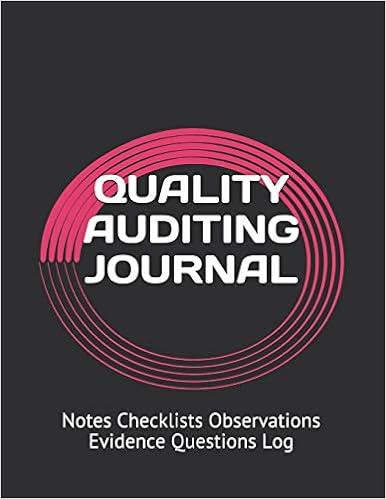Question
THANK YOU SO MUCH I WILL BE SURE TO LEAVE A GREAT RATING AND NOTE!!!!! 20. The primary difference between the periodic and perpetual inventory
THANK YOU SO MUCH I WILL BE SURE TO LEAVE A GREAT RATING AND NOTE!!!!!
20. The primary difference between the periodic and perpetual inventory systems is that a
periodic system determines the inventory on hand only at the end of the accounting period
periodic system provides an easy means to determine inventory shrinkage
periodic system records the cost of the sale on the date the sale is made
periodic system keeps a record showing the inventory on hand at all times
21.Merchandise is ordered on November 10; the merchandise is shipped by the seller and the invoice is prepared, dated, and mailed by the seller on November 13; the merchandise is received by the buyer on November 18; the entry is made in the buyer's accounts on November 20. The credit period begins with what date?
November 18
November 10
November 20
November 13
22. Using a perpetual inventory system, the entry to record the return from a customer of merchandise sold on account includes a
debit to Inventory
credit to Customer Refunds Payable
debit to Cash
credit to Inventory
23.The arrangements between buyer and seller as to when payments for merchandise are to be made are called
net cash
gross cash
credit terms
cash on demand
24.If the buyer is to pay the freight costs of delivering merchandise, delivery terms are stated as
FOB destination
FOB n/30
FOB buyer
FOB shipping point
25.Which document authorizes the purchase of the inventory from an approved vendor?
the petty cash voucher
the vendor's invoice
the purchase order
the receiving report
26. The primary objectives of control over inventory are
a.safeguarding the inventory from damage and maintaining constant observation of the inventory.
b.maintaining constant observation of the inventory and reporting inventory in the financial statements.
c.reporting inventory in the financial statements.
d.safeguarding inventory from damage and reporting inventory in the financial statements.
27. When merchandise sold is assumed to be in the order in which the purchases were made, the company is using
a.first-in, last-out.
b.first-in, first-out.
c.average cost.
d.last-in, first-out.
28. The inventory costing method that reports the most current prices in ending inventory is
a.LIFO.
b.FIFO.
c.average cost.
d.specific identification.
29. When using a perpetual inventory system, the journal entry to record the cost of goods sold is:
debit Cost of Goods Sold; credit Inventory
debit Cost of Goods Sold; credit Sales
No journal entry is made to record the cost of goods sold.
debit Inventory; credit Cost of Goods Sold
30. During a period of consistently rising prices, the method of inventory that will result in reporting the greatest cost of goods sold is
a.average cost.
b.weighted average.
c.FIFO.
d.LIFO.
Step by Step Solution
There are 3 Steps involved in it
Step: 1

Get Instant Access to Expert-Tailored Solutions
See step-by-step solutions with expert insights and AI powered tools for academic success
Step: 2

Step: 3

Ace Your Homework with AI
Get the answers you need in no time with our AI-driven, step-by-step assistance
Get Started


